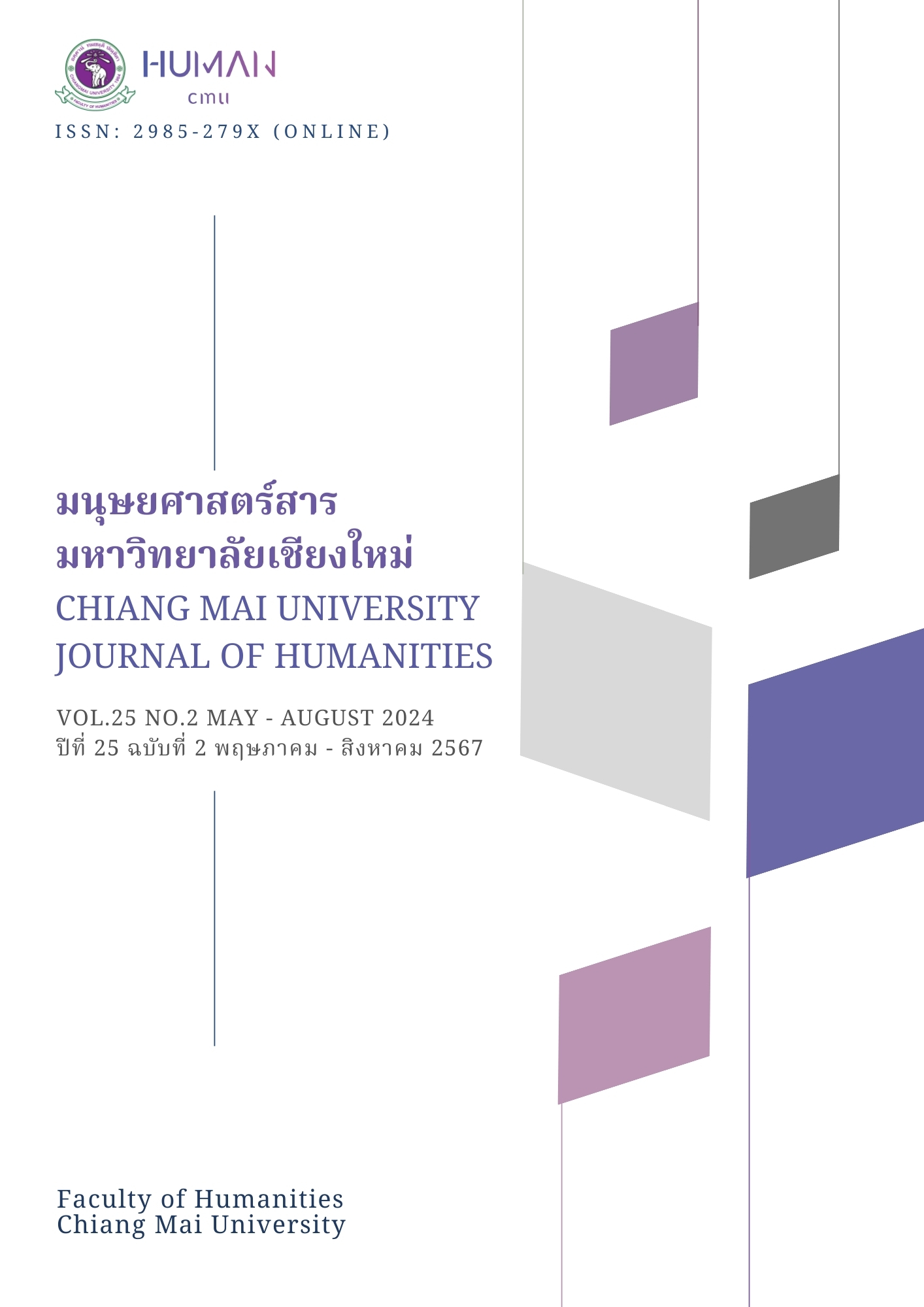การปรับตัวของธุรกิจโรงแรมที่ได้รับมาตรฐาน SHA Extra Plus ในอำเภอเมืองเชียงใหม่ จังหวัดเชียงใหม่ ภายใต้สถานการณ์แพร่ระบาดของโรคติดเชื้อไวรัสโคโรนา 2019 (COVID-19)
Main Article Content
บทคัดย่อ
บทความวิจัยนี้มีวัตถุประสงค์เพื่อศึกษาการปรับตัวของธุรกิจโรงแรมจากสถานการณ์การแพร่ระบาดของโรคติดเชื้อไวรัสโคโรนา 2019 (COVID-19) ของผู้ประกอบกิจการโรงแรมที่ได้รับมาตรฐาน SHA Extra Plus ในอำเภอเมืองเชียงใหม่ จังหวัดเชียงใหม่ เป็นการวิจัยเชิงปริมาณโดยใช้แบบสอบถามวิเคราะห์ข้อมูลด้วยโปรแกรมคอมพิวเตอร์สำเร็จรูปเพื่อคำนวณค่าความถี่และค่าร้อยละเฉลี่ย ผลการวิจัยพบว่า สถานการณ์แพร่ระบาดของโรคติดเชื้อไวรัสโคโรนา 2019 (COVID-19) ได้ส่งผลกระทบทำให้จำนวนผู้เข้าพักและรายได้ลดลงอย่างที่ไม่เคยเกิดขึ้นมาก่อน กลยุทธ์สำคัญที่โรงแรมนำมาใช้จัดการกับภาวะวิกฤต คือ สร้างมาตรฐานความปลอดภัยด้านสุขภาพอนามัย ลดราคาห้องพัก ลดพนักงานลง ปิดกิจการชั่วคราวและสร้างรายได้ใหม่ ตราสัญลักษณ์ SHA Extra Plus ส่งผลดีด้านชื่อเสียง ความเชื่อมั่นของผู้เข้าพัก ความปลอดภัยแก่พนักงานและสร้างมาตรฐานใหม่ด้านสุขอนามัย โดยส่วนใหญ่เห็นควรคงรูปบริการตามมาตรฐาน SHA Extra Plus ไว้
อย่างมีนัยยะสำคัญ
Article Details

อนุญาตภายใต้เงื่อนไข Creative Commons Attribution-NonCommercial-NoDerivatives 4.0 International License.
เอกสารอ้างอิง
กลุ่มงานยุทธศาสตร์และข้อมูลเพื่อการพัฒนาจังหวัดเชียงใหม่. (2560). บรรยายสรุปจังหวัดเชียงใหม่ ข้อมูลทั่วไปของจังหวัดเชียงใหม่. https://www.chiangmai.go.th/managing/public/D8/8D01Feb 2017150134.pdf
กลุ่มงานยุทธศาสตร์และข้อมูลเพื่อการพัฒนาจังหวัดเชียงใหม่. (2565). บรรยายสรุปจังหวัดเชียงใหม่. https://chiangmai.go.th/managing/public/D8/8D17Jan2022133138.pdf
เชียงใหม่บลูมส์ 2022 เทศกาลดอกไม้งามบานสะพรั่งทั่วเมืองเชียงใหม่. (5 กุมภาพันธ์ 2565). ผู้จัดการออนไลน์. https://mgronline.com/travel/detail/9650000012073
ดารณี อาจหาญ และสันติธร ภูริภักดี. (2564). กลยุทธ์การตอบสนองภาวะวิกฤตของธุรกิจโรงแรมในเขตกรุงเทพมหานครภายใต้สถานการณ์แพร่ระบาดไวรัสโควิด-19. วารสารการบัญชีและการจัดการ มหาวิทยาลัยมหาสารคาม, 13(4), 82-97.
นรพัชร์ อัศววัลลภ และกานต์ แจ้งชัดใจ. (2564). สถานการณ์ด้านการท่องเที่ยวของจังหวัดเชียงใหม่ในช่วงปลายปี 2564. วารสารการเงินการคลัง, 33(104), 52-59. http://www.fpojournal.com/fpojour nal-e-book-107/
ไปรยา แพพ่วง และบุษรา โพวาทอง. (2564). การปรับตัวของผู้ประกอบการโรงแรมในจังหวัดเชียงใหม่ต่อสถานการณ์การแพร่ระบาด COVID-19 ช่วง พ.ศ. 2563. วารสารสาระศาสตร์, 4(3), 624-636.
พระราชบัญญัติโรงแรม พ.ศ. ๒๕๔๗. (2547, 30 ตุลาคม). ราชกิจจานุเบกษา. เล่ม 121 ตอนพิเศษ 70 ก.
หน้า 12.
พุทธชาด ลุนคำ และรชฏ เลียงจันทร์. (22 มกราคม 2564). ธุรกิจท่องเที่ยวและโรงแรมหลัง COVID-19. Research Intelligence. https://www.krungsri.com/th/research/research-intelligence/ri-future-of-tourism-21
พระราชกำหนดการบริหารราชการในสถานการณ์ฉุกเฉิน พ.ศ. 2548. (2563, 26 มีนาคม). ราชกิจจานุเบกษา. เล่ม 137 ตอนพิเศษ 69 ง. หน้า 1-8.
ภูเก็ต แซนด์บอกซ์ (Phuket Sandbox) ดีเดย์ 1 ก.ค. 64 รวมเรื่องต้องรู้. (30 มิถุนายน 2564). ประชาชาติธุรกิจ. https://www.prachachat.net/tourism/news-702505
มิ่งสรรพ์ ขาวสอาด. (2563). ทิศทางท่องเที่ยวไทย หลังวิกฤตโควิด-19. Tourism economic review, 1(4), 42-53.
ราชบัณฑิตยสถาน. (2554). พจนานุกรมฉบับราชบัณฑิตยสถาน พ.ศ. 2554 (พิมพ์ครั้งที่ 2). นานมีบุ๊คส์.
สธ.แถลง พบคนขับแท็กซี่ ติดไวรัสโคโรน่า เป็นคนไทยรายแรก ไม่มีประวัติไปจีน. (31 มกราคม 2563). ไทยรัฐออนไลน์. https://www.thairath.co.th/news/local/bangkok/1761053
สำนักงานจังหวัดเชียงใหม่. (2563). สรุปผลกระทบจากสถานการณ์การแพร่ระบาดของโรคติดเชื้อไวรัสโคโรนา 2019 (COVID-19) ของจังหวัดเชียงใหม่. http://123.242.159.135/2558/index.php?option =com_attachments&task=download&id=3760
อมราวดี ไชยโย และเมทนี มหาพรหม. (2563). การจัดการภาวะวิกฤตของธุรกิจที่พักแรมในประเทศไทย ภายใต้วิกฤตการณ์ COVID-19. วารสารวิทยาลัยดุสิตธานี, 14(3), 685-700.
Bello, W. (3 June 2020). How Thailand contained COVID-19. Foreign Policy In Focus. https://fpif.org/how-thailand-contained-covid-19/
Glaesser, D. (2006). Crisis management in the tourism industry. Butterworth-Heinemann.
Henkin, T. C. (1979). Modern hotel and motel management. Cassell.
Kathleen, F. B. (2017). Crisis communication a casebook approach. Routledge.
Kotler, P., & Armstrong, G. (2014). Principle of Marketing (15th ed). Pearson.
Paraskevas, A. (2006). Crisis management or crisis response system? A complexity science approach to organizational crises. Management Decision, 44(7), 892-907.
Tourism Authority of Thailand. (2020). Amazing Thailand Safety & Health Administration (SHA). https://www.thailandsha.com/info_inside/27
Tourism Authority of Thailand. (2022). Amazing Thailand Safety & Health Administration (SHA). https://web.thailandsha.com/shaextraplus?Type=2&province=50&district =5001&keyword=
Ulmer, R. R., Sellnow, T. L., & Seeger, M. W. (2011). Effective Crisis Communication: Moving from Crisis to Opportunity (2th ed). Thousand Oaks, CA: Sage Publications, Inc.
World Tourism Organization (UNWTO). (2018). UNWTO world tourism barometer and statistical annex, November 2018, 16(4), 1-5. https://www.unwto.org/global/publi cation/unwto-world-tourism-barometer-and-statistical-annex-november-2018


